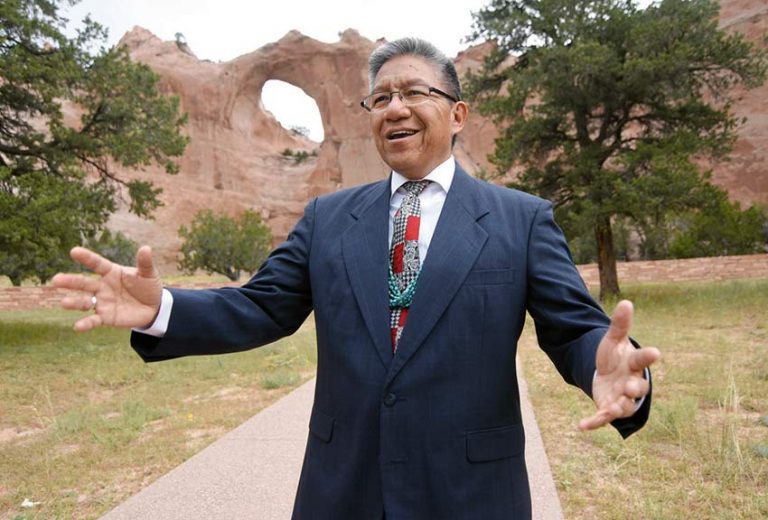
- Details
- By Neely Bardwell
Former Navajo Nation Vice President Myron Lizer, who is reportedly being considered for a key federal position, urged stronger engagement between tribal leaders and the Trump administration in separate interviews with the Navajo-Hopi Observer and Navajo Times.
“We need to get our plight and our issues on their radar. We need to put our agenda, the Indian Country agenda, on their list of priorities because otherwise it’s out of sight, out of mind,” Lizer told the Observer during an interview in Williams, Ariz.
As Trump prepares to take office after four years of a Democratic leadership in the White House, some tribal leaders have expressed concerns about the shift in political direction. Lizer emphasized the need for Native communities to take initiative in building relationships with the incoming administration.
“We have to assert ourselves a little bit, and that’s a different approach for tribes and Native Americans, especially with a Republican administration,” he said. “Hopefully, we’re warming up, and I’ll help, I will help get our priorities on their agenda.”
Lizer told Observer reporter Doreen Holtje that he believes the Trump administration can offer change that the Democrats never could.
“We’ve voted blue for five decades. Why hasn’t anything changed? We need to work with those who will help move our nation forward. When someone visits our lands from the East Coast or abroad, they often liken us to a third-world country. That reflects the condition of our tribal lands and reservations,” he said.
Lizer, who participated in Native News Online’s Election Recap Live Stream to advise tribal leaders on working with the Trump administration, expressed optimism about Trump’s focus on government efficiency.
“President Trump has enlisted the Department of Governmental Efficiency to streamline spending, and hopefully, they will see what Native Americans see and help them right now,” he said.
Speaking to the Times, Lizer reflected on his experience as Navajo Nation vice president and the challenges in federal-tribal relations. “Tribal leaders often encounter red tape when seeking solutions to problems. I think it’s important to prioritize issues and communicate them effectively to federal leaders, even the White House,” he told the Times. “Solutions come from partnerships and understanding, not from dictation by the government.”
He emphasized to Times reporter Donavan Quintero that economic development must be a priority. “The pandemic shifted the way society operates. Tribal nations should seize this moment to attract businesses and create jobs,” Lizer said. “We can’t always rely on federal support. It’s time to build self-reliance.”
He voiced similar concerns in the Observer interview, addressing the issue of economic impact and opportunities specifically within the Navajo Nation community. Navajo Nation doesn’t have “enough industry or energy jobs anymore,” Lizer said. This is something he wants to see changed.
“We lost thousands of jobs when Navajo Generating Station closed, and now other plants are set to close. How do we replace those jobs? Solar and renewables create initial construction jobs, but long-term maintenance doesn’t offer the same level of employment,” he said.
Lizer sees potential in corporate partnerships, telling the Observer, “Corporations like Tesla already leverage tribal sovereignty for competitive advantages. More collaborations like this can drive economic growth and innovation. By working together, we can turn challenges into opportunities for our communities.”
Looking ahead, Lizer told the Times his vision is one of progress, unity and resilience. “The ceiling is high for Indian Country,” he said. “Whether or not I step into this federal role, I’ll continue working to help tribes rise to new heights.”
More Stories Like This
Native News Weekly (August 25, 2024): D.C. BriefsUS Presidents in Their Own Words Concerning American Indians
Navajo Man Faces Vehicular Homicide Charge After Child Killed at Navajo Nation Christmas Parade
Suspected Drunk Driver Crashes into Parade in Kayenta on Navajo Nation, Killing 1 & Injuring 3 Others
Tribal Broadband to Get $6.5M Boost as NTIA Plans Consultations
Help us defend tribal sovereignty.
At Native News Online, our mission is rooted in telling the stories that strengthen sovereignty and uplift Indigenous voices — not just at year’s end, but every single day.
Because of your generosity last year, we were able to keep our reporters on the ground in tribal communities, at national gatherings and in the halls of Congress — covering the issues that matter most to Indian Country: sovereignty, culture, education, health and economic opportunity.
That support sustained us through a tough year in 2025. Now, as we look to the year ahead, we need your help right now to ensure warrior journalism remains strong — reporting that defends tribal sovereignty, amplifies Native truth, and holds power accountable.
 The stakes couldn't be higher. Your support keeps Native voices heard, Native stories told and Native sovereignty defended.
The stakes couldn't be higher. Your support keeps Native voices heard, Native stories told and Native sovereignty defended.
Stand with Warrior Journalism today.
Levi Rickert (Potawatomi), Editor & Publisher

